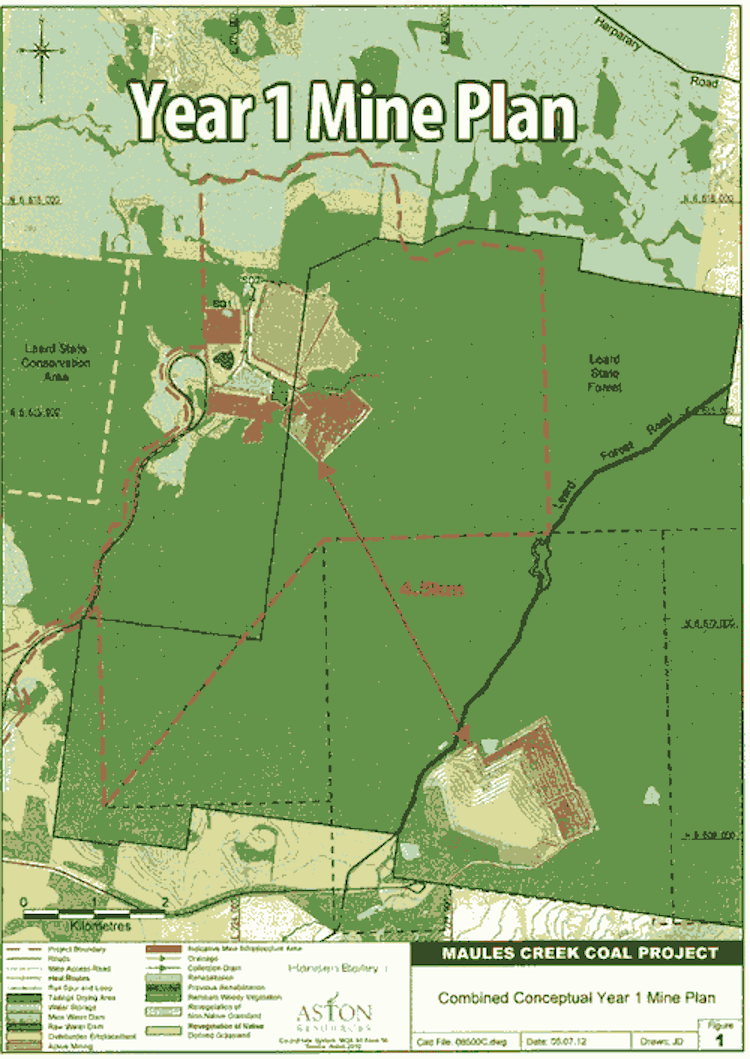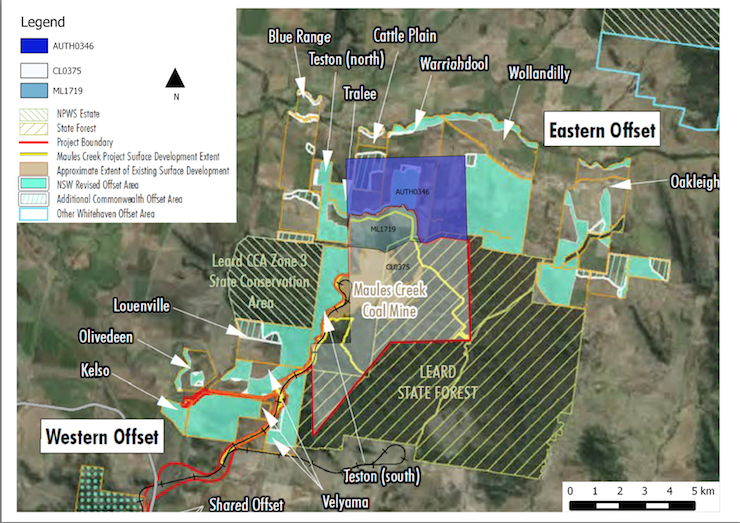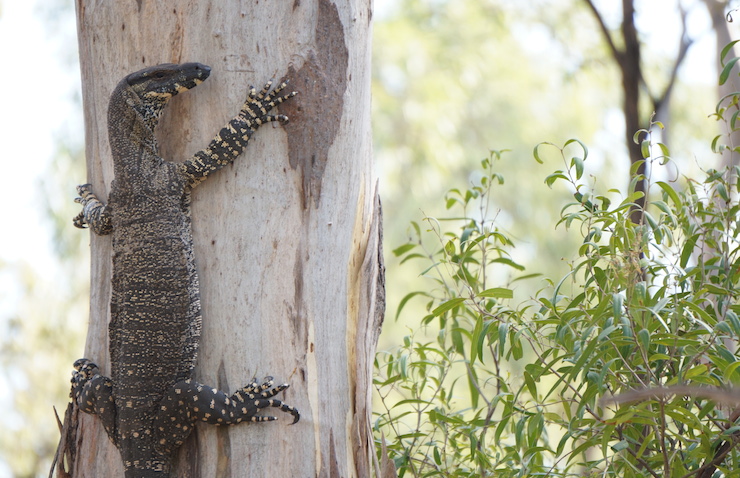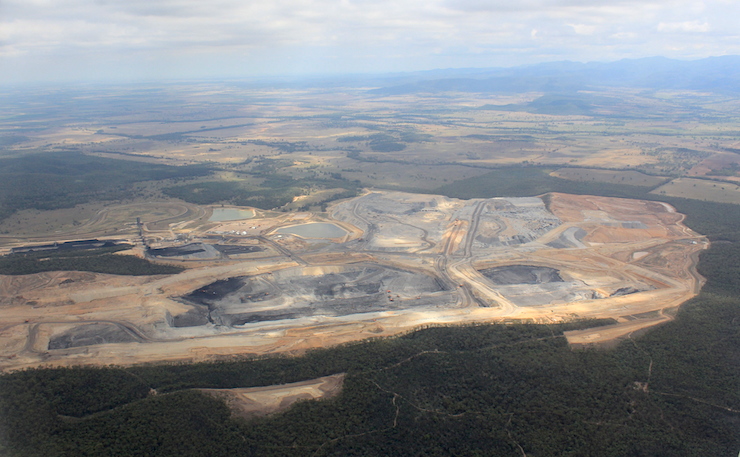A coal mine already at the centre of protracted controversy appears to be weighing up its options for an expansion of operations. Thom Mitchell reports.
Mining company Whitehaven Coal appears to be quietly feeling out the prospects of an expansion of its Maules Creek mine, which has already proved so controversial it’s led to the arrest of more than 450 activists involved in a years-long campaign to shut the operation down.
The company is understood to be carrying out a drilling program on land to the north of its existing project, which is two years into an approved operation that will see the critically endangered Leard State Forest knocked down.
The project was so polarising its development was plagued by the first blockade of a coal mine in Australian history. In 2014, Whitehaven Coal’s environmental plans briefly became the subject of a criminal investigation, which was later dropped.
The land which is now subject to exploration was purchased as part of an environmental ‘offset’ package, required by government as a sort of ecological compensation for the destruction of the Leard State Forest. The company says it will not explore or mine for coal on land that’s legally protected under these arrangements.
The destruction of the Leard Forest has been controversial because it is home to more than 30 endangered species. Much of it will be bulldozed, blown up, and excavated to make way for the Maules creek mine, which was originally the brainchild of failed coal speculator Nathan Tinkler.
The Department of Environment has told New Matilda that Whitehaven “has not informed the Department of any intended exploration activities in the approved biodiversity offset areas for the mine”. The Department of Resources and Energy said that despite the exploration license covering the farmland now being explored having expired in February, Whitehaven Coal was still entitled to prospect there.

The company said it “has discussed, and will continue to discuss, its program of approved exploration activity within its authorisation boundary openly with the local community through the auspices of the Community Consultation Committee”.
The minutes of the latest meeting of that Committee, in March, reference the drilling program. The Community Consultative Committee itself, however, has proved controversial in the past. For more than a year, Whitehaven Coal failed to fill the role of an environmental representative on the committee, which the government required as a biodiversity oversight mechanism.
As New Matilda reported in 2014, this was not done. Minutes falsely suggested conservation group Greening Australia was acting as an Environmental Representative, and Whitehaven Coal was later fined for the breach.
The Independent Chair of the Committee, John Turner, who oversaw the false minutes, has also proved a controversial figure. A former Deputy Leader of the New South Wales National Party and Shadow Mining Minister, he was in the news again this week.
As New Matilda reported, Labor and the Greens have demanded he resign from his new position as Administrator of one of the state’s recently convened super councils, citing concerns his ties with the coal industry are too close.
While the exploration program, and how it might affect legally protected offset areas, has stoked concern, it’s clear a series of environmental and other planning processes would need to be cleared before the land now being explored could be mined, and the Maules Creek mine expanded.
In response to questions put this week, the company said it “[will not]conduct exploration activity or mining activity on areas of land reserved as offsets, full stop”. The properties Whitehaven Coal purchased to provide offsets were bought as whole farms, and only fragments of those property lots have been set aside as offset areas required by the mine’s conditions of approval.
The tenement that Whitehaven is now exploring is known as A346. It’s depicted visually in dark blue, in the map below. The areas legally required to be preserved as ‘environmental offsets,’ to compensate for the destruction of the Leard Forest, are shown in light green.

According to the Department of Energy and Resources, Whitehaven is permitted to carry out “low intensity exploration and environmental monitoring activities that do not disturb land” on the A46 tenement. “More intensive activity requires additional environmental assessment and approval,” a spokesperson said.
In order to actually mine the tenement, the company would be required to submit a series of further plans to government. At this stage, it is simply engaged in a process of gauging the quantity and quality of coal beneath that land.
The company declined to comment on the suggestion, but it may be that Whitehaven Coal is searching for a substitute for resources that were ripped out from under it by a Federal Government approval condition in 2013.
As New Matilda has previously reported, freedom of information documents show that the company implored the government not to go ahead with a condition requiring it to maintain a Biodiversity Corridor through the centre of the Leard State Forest.
In a closed-door submission, Whitehaven Coal said that the 250 metre buffer-zone, which is designed to allow wildlife to travel across what was once the Leard Forest, between land offsets to the North and South, would be “a material risk to the project’s success”.
In the documents obtained by New Matilda, Whitehaven lays out “high level calculations, to quantify in dollar terms, the coal sterilisation that would occur”. The coal that can now not be mined as a result of the condition amounts to around 16 per cent of what the company had initially bargained on.
According to Whitehaven’s figures, 38.6 million tonnes of a total 240 million tonnes will be “sterilised” by the requirement. Between Whitehaven’s Maules Creek Mine and the neighbouring Boggabri Coal Mine – an Idemitsu Resources Project eating into the Leard Forest from the opposite end – the biodiversity corridor will come at a cost of $9.96 billion in lost revenue.

Plans from 2011 suggests the A346 tenement contains a ‘probable’ reserve of 40 million tonnes – or slightly more than what was sacrificed when the Federal Government required the biodiversity corridor as a condition of approval.
Coincidental though it may be, the figures are purely speculative. But the National Coordinator of Lock the Gate, Phil Laird, said the community deserves to know Whitehaven Coal’s plans. The Leard forest takes its name from Laird’s family, and he has always maintained the Maules Creek Mine should be an underground operation.
“The only way to get an inkling of their future plans is though the companies community “consultation” committees which appear to be run to minimise consultation,” Laird said. “The atmosphere is tense and the community reps feel bullied. Information is not available in a timely manner or in a electronic form that is usable to inform the community.”
The Environmental Representative on the Maules Creek Community Consultative Committee, botanist Dr Kerri Clarke, agreed with Laird, saying her experience has been “exactly that”.
Laird said that in reality New South Wales has “an approval system, not a planning system”. He’s concerned that the local farming community has been mislead if Whitehaven plans to mine more coal than was approved as part of the original Maules Creek project.
“The people who are affected by these mines should actually know what the long term game is, because we need to plan our futures. Companies actually know what they’re going to do – it’s just not discussed with us,” he said.
“The Planning Department… just wants to get an approval through, get the royalties flowing, and sort out the future extensions or adaptations later.”
In a statement to New Matilda, Whitehaven Coal said concerned persons should contact them.
“To the extent that any residual concerns might exist, community members can raise these with us directly via our community hotline or by coming to talk with us directly at our new permanent office that was opened on Tuesday in Gunnedah,” a spokesperson said.
Donate To New Matilda
New Matilda is a small, independent media outlet. We survive through reader contributions, and never losing a lawsuit. If you got something from this article, giving something back helps us to continue speaking truth to power. Every little bit counts.





